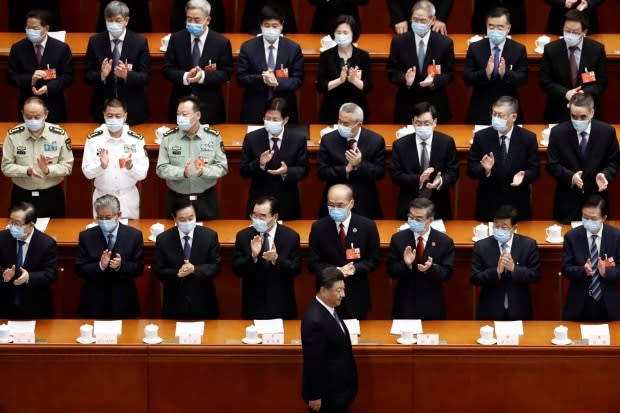U.S. threatens to strip Hong Kong of special status amid tension with China

The United States has threatened to strip Hong Kong of the special legal status that has enabled it to remain a global business powerhouse in a move that could escalate tensions with China.
Secretary of State Mike Pompeo said Wednesday that he informed the U.S. Congress of his view that in light of recent events, Hong Kong is no longer autonomous from China.
Pompeo's announcement would enable Congress to end longstanding rights to freer trade and travel between Hong Kong and the U.S. that are more open than conditions applied to mainland China.
"No reasonable person can assert today that Hong Kong maintains a high degree of autonomy from China given facts on the ground," Pompeo said in a statement.
"Hong Kong and its dynamic, enterprising and free people have flourished for decades as a bastion of liberty, and this decision gives me no pleasure.
"But sound policy-making requires a recognition of reality. While the United States once hoped that free and prosperous Hong Kong would provide a model for authoritarian China, it is now clear that China is modelling Hong Kong after itself."
Change would have implications for tariffs, travel
That sets the stage for what one analyst said would be "the nuclear option": stripping the region's status under the 1992 U.S.-Hong Kong Policy Act, which recognizes Hong Kong as distinct from China.
"That would have many implications, including extending all U.S. tariffs that exist on China to Hong Kong," said Bonnie Glaser of the Washington-based Center for Strategic and International Studies.
"It would make travel to the U.S. for Hong Kongers more difficult, and it would likely trigger a departure of many expatriates living and working in Hong Kong."
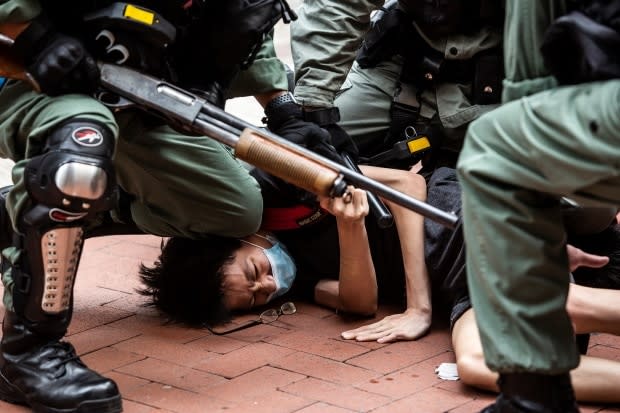
The implications of that would ripple across the world, and Canadians would feel it, too, said Lynette Ong, of Toronto's Munk School of Global Affairs and Public Policy.
Speaking in a weekend interview, before Pompeo's announcement, she said any pension fund, capital market or business with interests in Hong Kong would be affected if the region lost that legal status.
"That would have quite massive ramifications. That's not a decision that should be taken lightly," Ong said. "It has implications not only for the United States but for everybody. For you and me."
Canada, which also holds a series of special agreements with Hong Kong on taxes, trade and foreign investment protection, has not issued a warning similar to the U.S.
Any foreign action involving Hong Kong draws the risk of reprisals: China has said the U.S. should butt out of its internal affairs, and earlier this week a foreign ministry spokesperson said Beijing would take "all necessary measures to fight back" against outside interference.
U.S. still has some cards to play against China
CBC News reached out to a half-dozen North American authorities on China last weekend after pro-democracy politicians were arrested and Beijing threatened a law expanding its control over the country's semi-autonomous enclave.
The general view of the experts contacted was that Washington still has several tools at its disposal to influence the outcome in Hong Kong. Aside from threatening Hong Kong's crucial trade status, it can punish rights abusers with sanctions and grant U.S. visas to protesters.
But they shared three warnings.
First, such actions might not work. Second, they might even rebound to harm the U.S. and Hong Kong itself. And finally, there's a high-ranking wild card: U.S. President Donald Trump.
Trump, the ultimate wild card
It's still unclear how deeply Trump cares about the Hong Kong issue. He's sent mixed signals.
On the one hand, he promised last week he'd react "very strongly" to any Beijing power grab and elaborated Tuesday that he'd have an "interesting" announcement soon. He's also made standing up to China one of his main re-election arguments.
Yet there's scant evidence of Trump taking an interest in the political freedoms of Hong Kong residents. He tweeted 118 times during the three-day Memorial Day long weekend yet Hong Kong didn't come up once in his Twitter feed.
Trump's clearest tweet about Hong Kong is six years old, and what he said back then was that former president Barack Obama shouldn't bother supporting its protesters.
Hong Kong — a long-term U.S. dilemma
American uncertainty about Hong Kong was etched into its response from the very first day the former British colony reverted to Chinese control.
Then-secretary of state Madeleine Albright flew in for the 1997 celebration but made a point of snubbing one event. Voicing a fear that residents' political freedoms might disappear, she skipped the opening of the new Hong Kong legislature.
That fear of lost autonomy is now materializing, and a quarter-century later, the United States is running into a hard deadline for picking a path on Hong Kong.
The main difference now is that the U.S., no longer the unrivalled superpower it was in 1997, is running lower on options for influencing events within China.
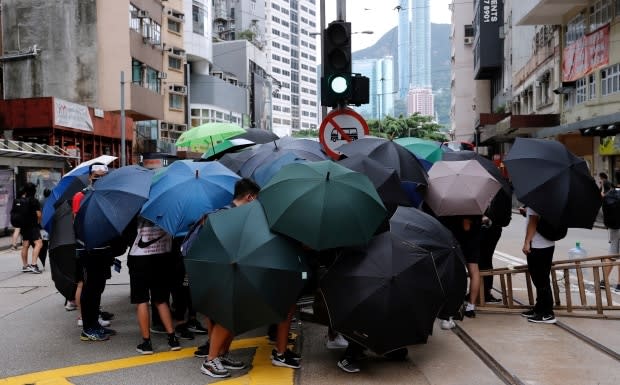
'The beginning of the end of Hong Kong's uniqueness'
When asked if the U.S. is still capable of affecting Hong Kong's trajectory, Ong hesitated.
"Maybe. Maybe, possibly," she said.
"I hate to say this, but I think it's the beginning of the end of Hong Kong's uniqueness."
WATCH | Thousands in Hong Kong protest China's national security bill on Sunday:
Bill Bishop, a writer and businessman who's lived in Beijing and Washington and writes a daily China newsletter, Sinocism, expressed skepticism in a weekend interview that the U.S. would take major action in defence of Hong Kongers.
"I don't think [Trump] actually cares about the human rights stuff," Bishop said.
Still, the U.S. has significant interests in Hong Kong, with 85,000 American citizens and more than 1,300 businesses located there.
Hong Kong also remains a critical point of contact between China and the outside world. A majority of the foreign business investment in China occurs through Hong Kong.
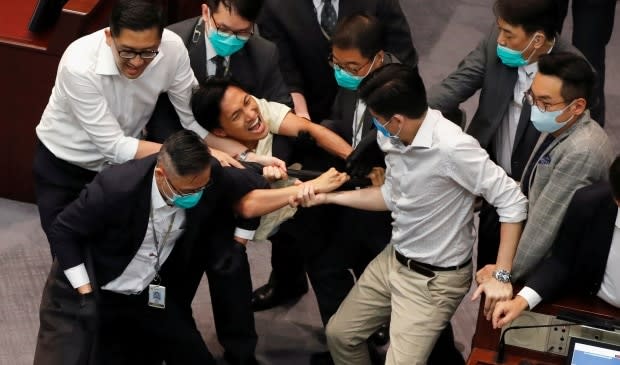
Three potential U.S. policy tools
A former Canadian ambassador to China, David Mulroney, said it's still possible for democracies to influence the course of events in Hong Kong.
He said it's imperative to push back and buy time for Hong Kong residents to vote this fall in their legislative elections, which might allow them to send a strong pro-democracy message.
"It's very late in the day, but it's not too late," he said.
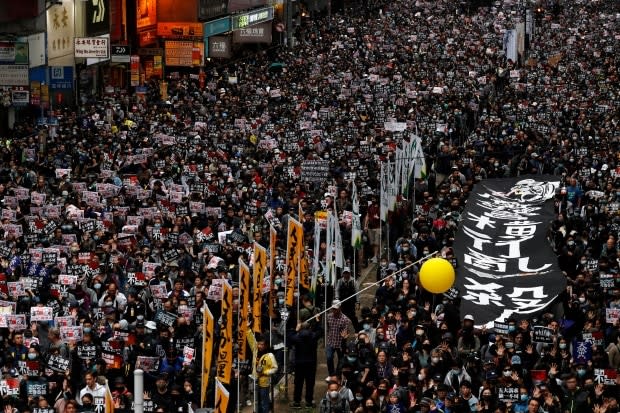
Mulroney identified three broad sets of actions the U.S. and allies might take:
Migration: Protesters should be reassured, Mulroney said, that they would be allowed to enter the U.S. if they have been arrested for political dissent.
Trump's national security adviser Robert O'Brien said in a weekend interview with NBC that he expects an exodus of financial capital and human talent from Hong Kong: "You're … going to have a terrible brain drain."
Bishop, however, said he doubts Trump would open the immigration floodgates — he's actually restricting immigration during the pandemic.
Sanctions: Mulroney said the U.S. and allies could freeze assets and deny entry to rights-violators.
Glaser said there could be targeted sanctions against entities and individuals who violate the terms of the 1984 U.K.-China agreement.
The agreement promised Hong Kong a high degree of autonomy for 50 years after the transfer, meaning until 2047.
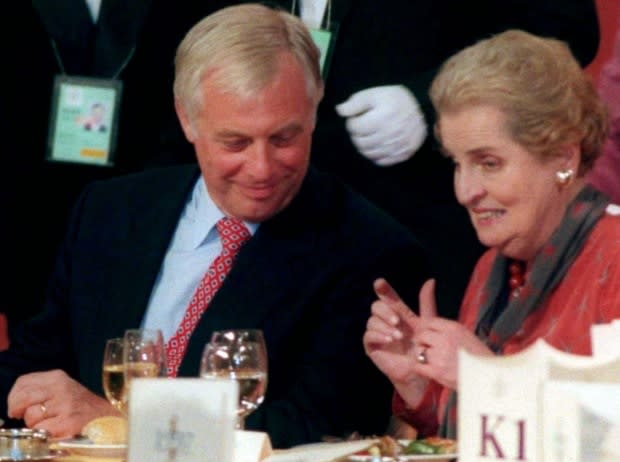
Stripping Hong Kong's status: That's what Pompeo alluded to Wednesday. Under a U.S. law passed last year with near-unanimous support, the State Department must report annually to Congress on whether Hong Kong still deserves the distinction set out in the 1992 law.
The death of Hong Kong?
Can any U.S. action scare China's president, Xi Jinping, into reversing course?
"To be honest, not much at this point [would make a difference]," Bishop said over the weekend.
"The U.S., the international community, can condemn and punish. But I think it's very unlikely — if in fact not totally impossible — that any such punishment will actually lead to Beijing changing its decision or modifying its behaviour."
